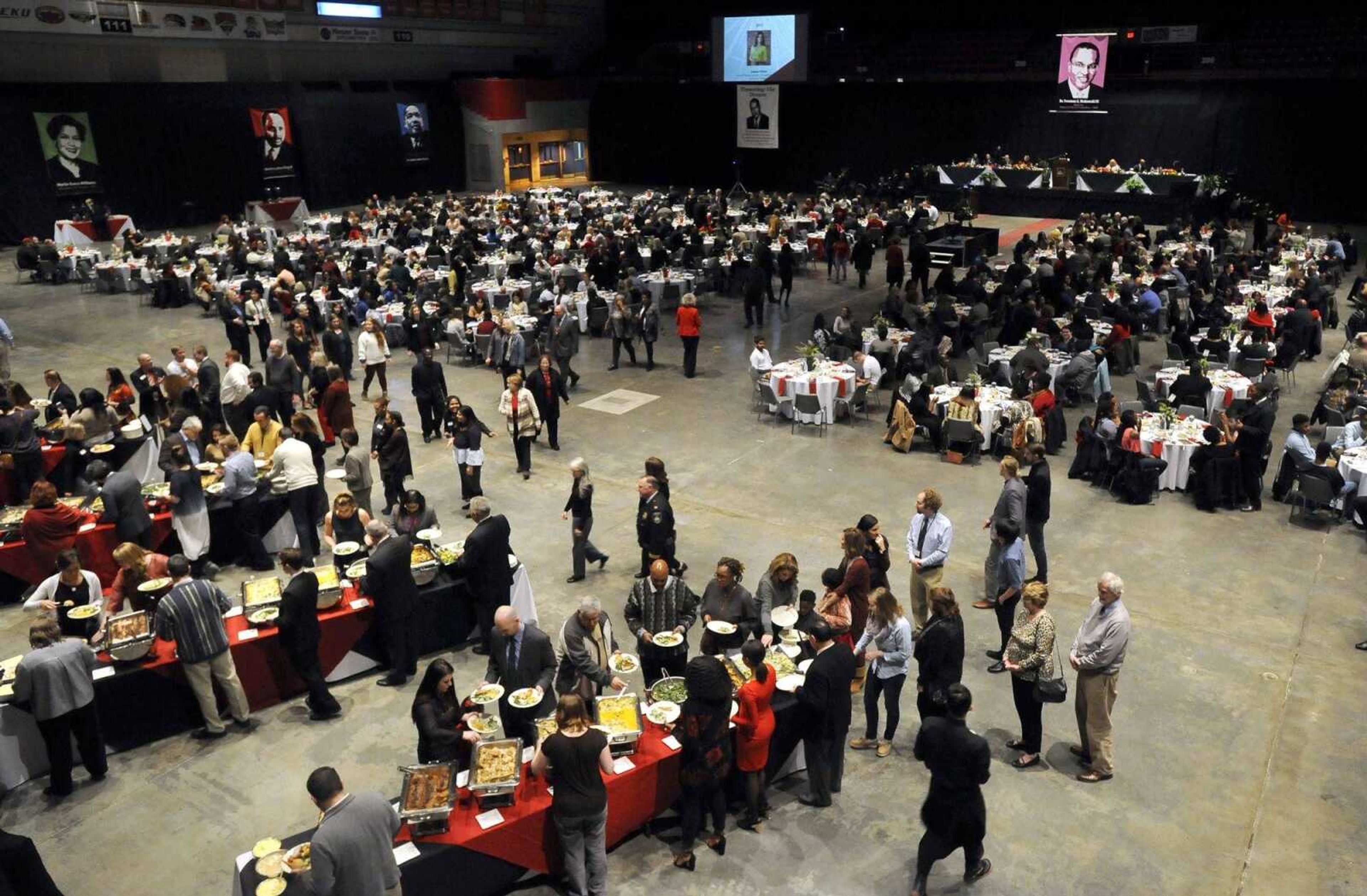Southeast Missouri State University's 13th annual Dr. Martin Luther King Jr. Celebration Dinner brought hundreds of community members together Wednesday night at the Show Me Center, with the message: "Where do we go from here?"
The night's keynote speaker was Freeman A. Hrabowski III, president of the University of Maryland-Baltimore County and a lifelong civil rights activist. He was arrested in 1963 when he was 12, marching with King in the Birmingham Children's Crusade.
Sonia Rucker, assistant to the president for equity and diversity and dean of students, said before the event the dinner, held every year to mark King's birthday, has become a capstone event for the university.
The event led with the national anthem, performed by Brianna Justine, a Southeast freshman, and jazz ensemble the American Standards, and a prayer from pastor Benjamin Porter before Hrabowski addressed the audience.
Hrabowski said he was not a courageous child, but was convinced after hearing King's words, from the back pew of a deep south church, that even the actions of children will have an impact on tomorrow. His goal, Hrabowski said, was to think of the possibilities.
He read from Maya Angelou's "On the Pulse of the Morning" with the words "Lift up your eyes upon this day breaking for you. Give birth again, to the dream."
He referenced the 1937 novel "Their Eyes Were Watching God," with the message there are two types of people: those who see their dreams fulfilled and those whose dreams seem forever deferred. The fundamental difference, he said, is education.
"If you were alive in the 1960s, you understand that the group assembled in this room tonight represents the impact of his dream," Hrabowski said.
But the challenge, he said, is that for the utterly poor, the probability of earning a degree is about the same as it was in the 1960s.
"I wish that every child had somebody at home who realized the value of the education system," he said. "Our job is to prepare a new generation of leading citizens. It's not simply about Dr. King, or one person. It's about all of us here tonight, who share his dream."
He said the civil-rights movement is for every family to experience those same fundamental human rights.
Hrabowski closed with the that idea seeking evidence in every truth and, most importantly, voting are rights that must be exercised.
"Keep in mind, you are blessed to be in the greatest country the world has ever seen," he said. "If people died so that we can vote, how dare we not?"
Hrabowski said that to uphold King's dreams and values is to help people, especially the young, impoverished and disenfranchised to know they have a voice.
Trenden Everett, a theater major at Southeast, said hearing from speakers who are continuing King's legacy of progression, peace, nonviolence, and National unity provides guidance for a young person's path.
"After we graduate, we're going to be the next step in the real world; in our businesses and our jobs and impacting our community," Everett said. "We need a path to help us see what types of steps we would like to take."
Before the event, James Williams, assistant director of Southeast's Academic Support Centers, said that in this 50th year since King's death, it is important to remember what he stood for, especially in the times we live in, with a country so divided.
"Fifty years later, are we really living that dream?" Williams said. "If he were alive right now, what would that dream look like for him right now? Would he be pleased with us as a black community, or as a country right now?"
Cape Girardeau Mayor Harry Rediger said before the event the city is working towards the ideas King exposed the nation to in the 1960s, of togetherness and inclusiveness. He said increasing homeownership, emphasis on education and early childhood development are means to that end.
Banners hanging in the venue displayed the distinguished men and women who have spoken at the dinner in years past, along with the words of King, who would have been 89 this year.
Connect with the Southeast Missourian Newsroom:
For corrections to this story or other insights for the editor, click here. To submit a letter to the editor, click here. To learn about the Southeast Missourian’s AI Policy, click here.







